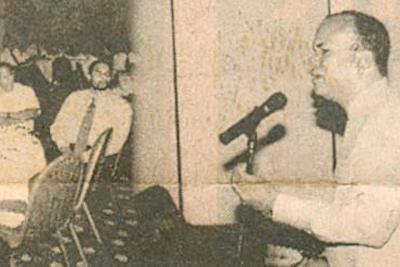

| 25/03/2004 - Daily Mirror | |||
| Milinda talks of bane of Sri Lanka at FCCSL forum |
|||
 |
|||
“When governing a country, any political party or politician must be able to take straight forward decisions. During the last two years there were times when the prime minister did not have the power to take such decisions. This power was held by the Executive President,” Mr. Moragoda said during the breakfast meeting yesterday organized under the Key Person Forum organized by the Federation of Chambers of Commerce and Industry (FCCISL). He went on to say that there are many discrepancies within the electoral system of Sri Lanka. This current system is not only a problematic, but it has also turned out to be a rather costly exercise for our country’s democratic system. Although Mr. Dinesh Goonewardena was appointed as head of a committee to investigate the electoral system, this committee was unable to act on their findings due to elections being called ahead of time. “During the last two years the Government of Mr. Ranil Wickremesinghe attempted to develop our country. The government ability to make headway with the peace process also allowed the country to establish the foundation for a stable economy. All this was done with the aim of developing our nation, and was not done with any other ulterior motives in mind. There are no shortcuts to solving the problems of our country. If the government had been allowed to go ahead with the plan that they had laid out, every man, woman and child in our country would have had the opportunity to feel the effects of development within the next year which would have marked three years since the UNF Government took office,” Mr. Moragoda said. “We can expect development in the industrial sector to take place only if there is economic development as well. Industrial development automatically paves the way for the creation of new jobs. Even though there are very few differences between the ideologies of the two major parties, they have not been able to come to a common consensus when dealing with issues regarding national interest, education, economy, health etc. Though the Prime Minister has made numerous attempts at bridging the gap between the two major political parties, he has thus far been unsuccessful at achieving a common consensus during the past two years,” he added. It was also pointed out that many problems have arisen due to the volatility that exists within the public sector. “The administration of this country falls apart when strings are constantly being pulled at the provincial, local and central governments levels. The only way that the country can emerge from this situation is if each level of government is allowed to remain autonomous, and if these levels of government create a dialogue with each other,” Mr.Moragoda told the FCCISL forum. |
|||